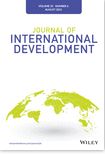
Does food security matter to subjective well-being? Evidence from a cross-country panel
Kornher, Lukas / Tekalign Gutu SakketaExterne Publikationen (2021)
in: Journal of International Development 33 (8), 1270-1289
DOI: https://doi.org/10.1002/jid.3575
Open access
The conventional economics literature equates welfare with consumption-based utility, neglecting the psychological effects of uncertainty and fear of the future on well-being. In this study, we examine how food insecurity relates to changes in subjective well-being within a comparative analysis across different country groups between 2005 and 2018 and find that food insecurity matters to well-being. We also examine the relationship between experienced food insecurity and well-being, taking into account any potential endogeneity. In low-income, food-deficient, food-importing and drought-affected countries, changes in the prevalence of undernourishment explain a great deal of the variation in subjective well-being over time.

